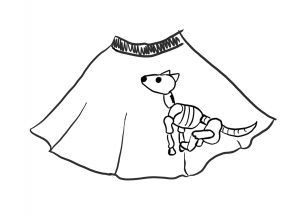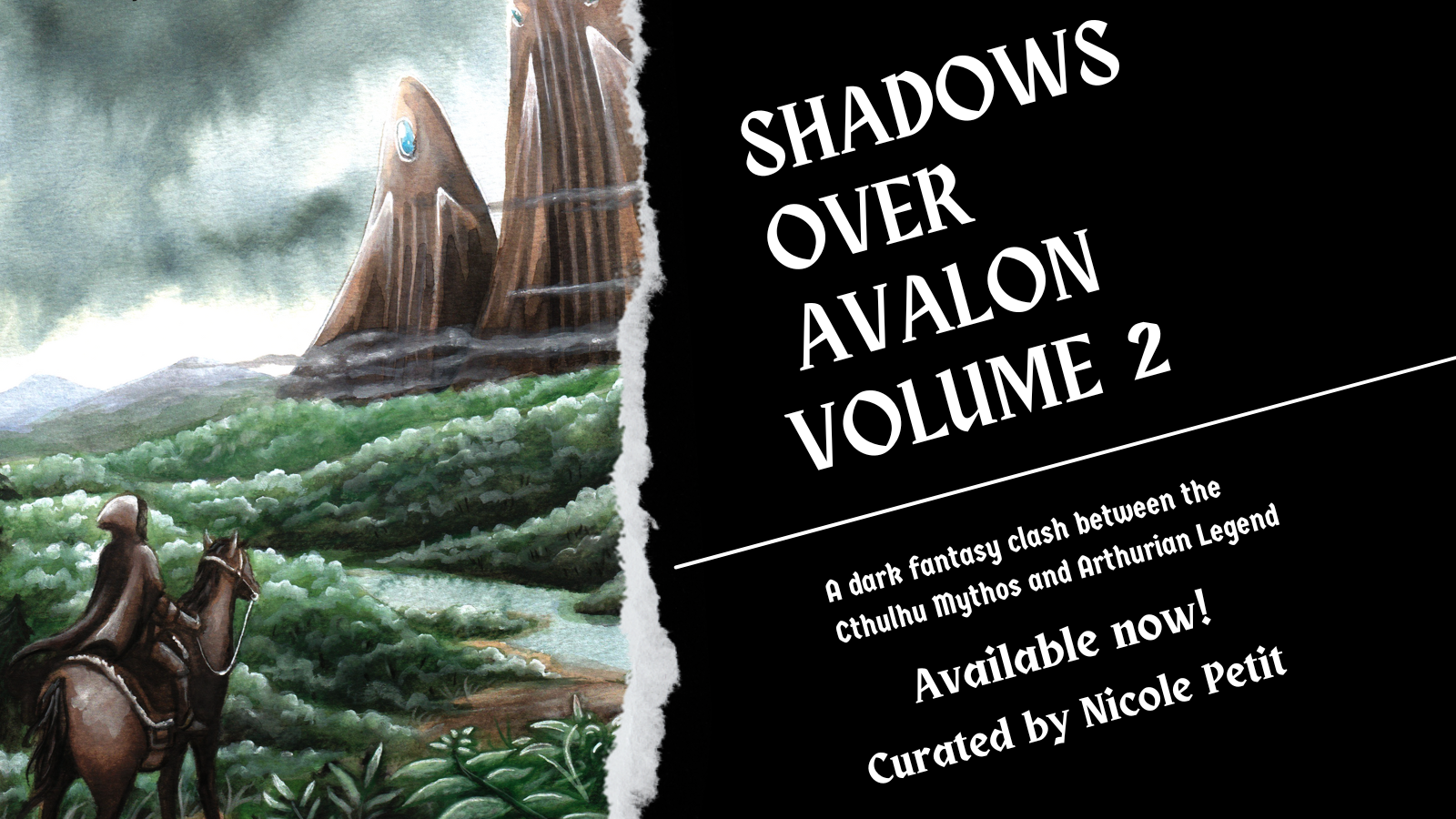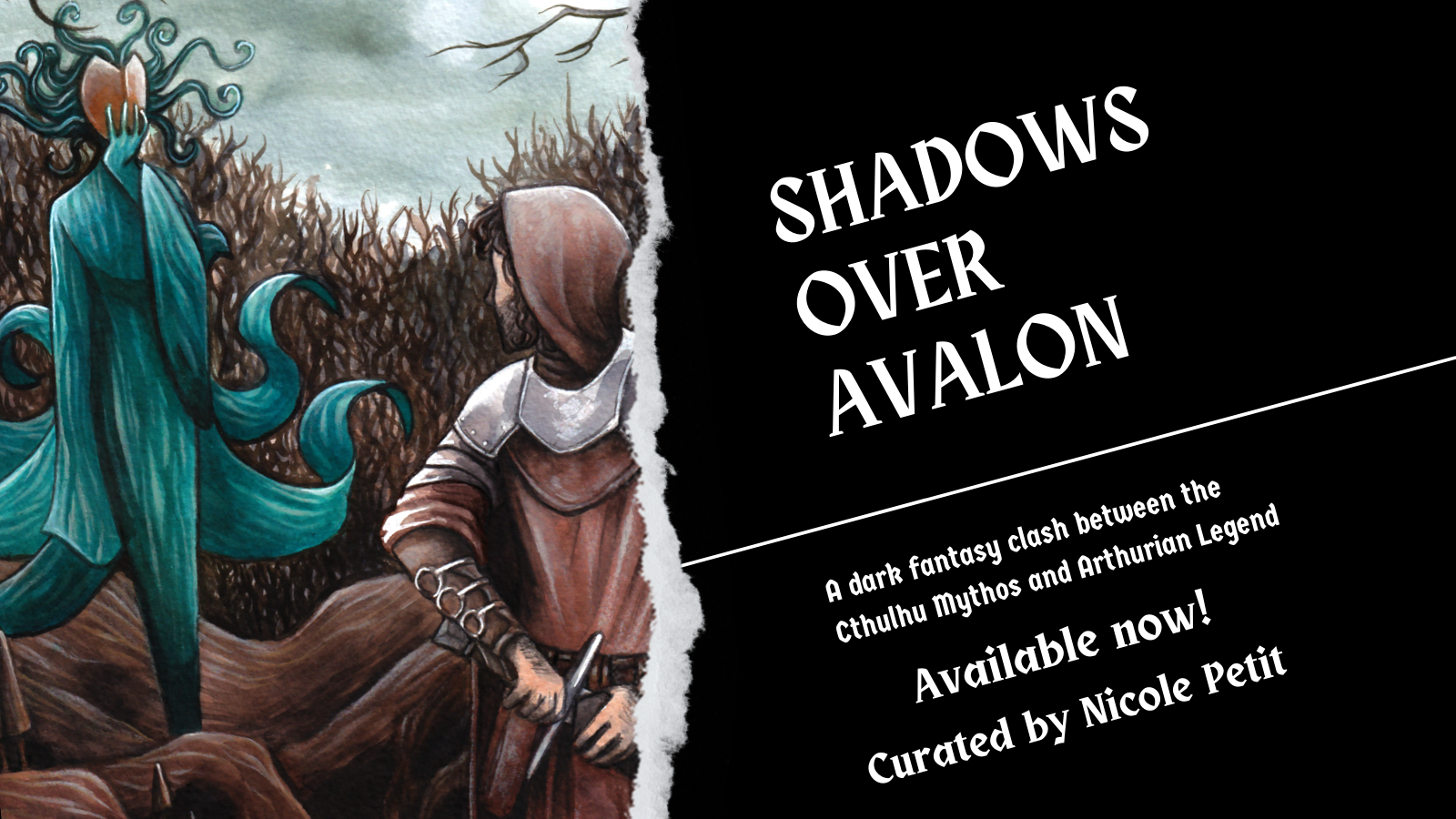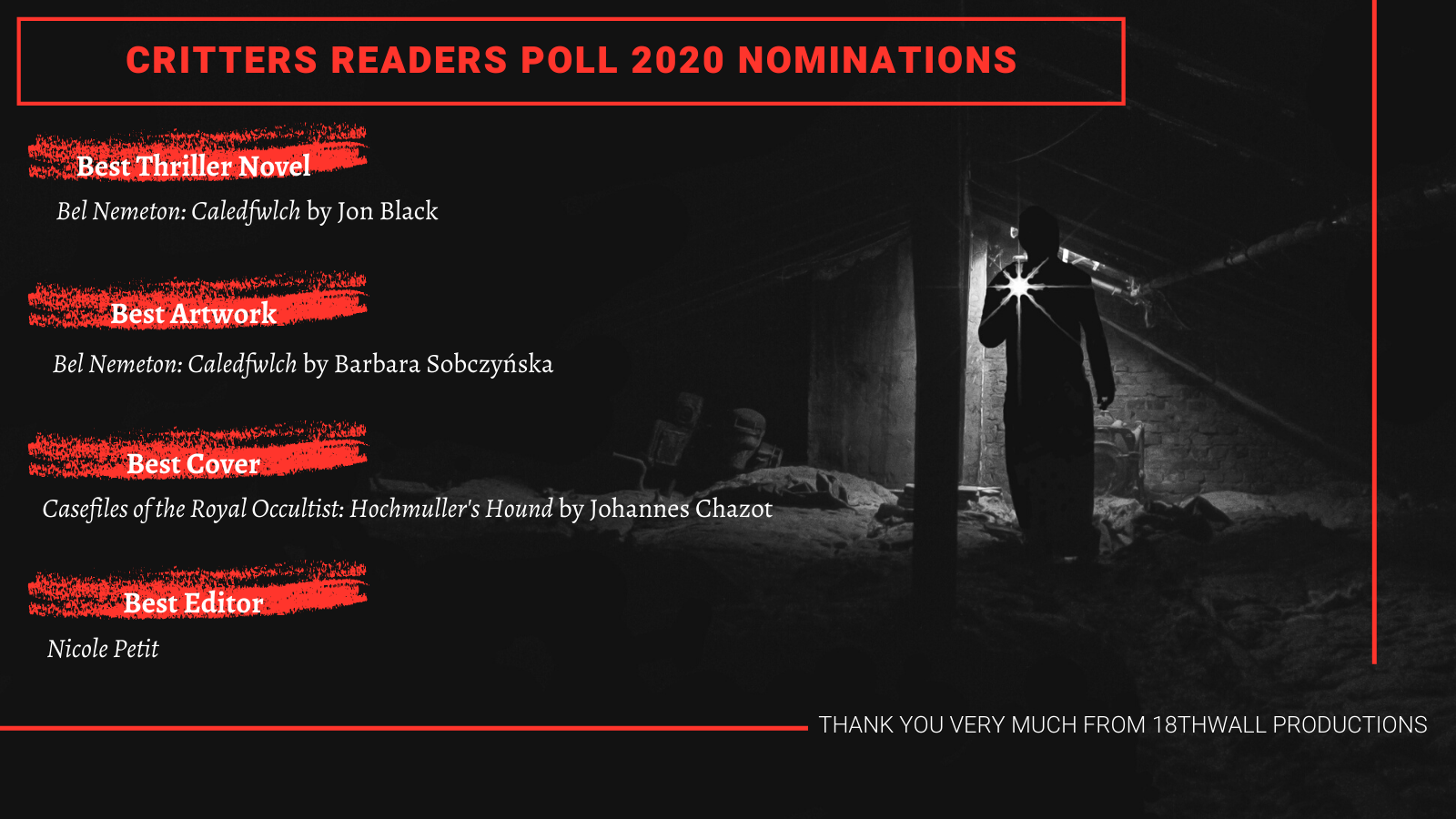We’re pleased to present our next excerpt from Sockhops & Seances – an exclusive look at Josh Reynolds’ “Unquiet in the Earth.” In the first 1950s-set Royal Occultist story, Ebe Gallowglass must navigate the magic politics of the post-war era. Giants rise up in Cornwall, but are they the most dangerous thing afoot?
AMAZON US | AMAZON UK | AMAZON CA
EBOOK
18THWALL | AMAZON US | AMAZON UK | AMAZON CA

Ebe Gallowglass slumped back in her chair, after pouring two cups of tea. One for her, and one for her guest. The tea was loose leaf, and bits floated in the dark surface of each cup. “Well,” she said, after a moment. “What do you want, then?”
Her guest, Morris, sat across from her and sipped his tea, looking as if he’d rather be anywhere else. He was young, and fit, stamped from a Ministry mould, his sense of style purloined from Ian Fleming. A tailored suit the colour of boredom, and a smile that had been practiced in a mirror. But his eyes weren’t as disciplined as his smile. They darted around, nervous and greedy. He looked at the books on her shelves, the statues in the corners, and wanted it all, even if he didn’t know what half of it was.
In contrast to her guest, Gallowglass was small and dark. She dressed like a man, even now, thirty years removed from her youth. Her long hair was shot through with silver, but her face was unlined, despite her age. A trio of iron rings adorned the fingers of her left hand, and she clinked them together absently as she studied her guest, and waited for him to answer.
Morris looked like he thought a man like him ought to look. His predecessor—also named Morris—had looked like anything but what he was. That Morris had been a monster, but he’d looked like a banker. In comparison, this one was just a boy playing dress-up.
The whole of England felt that way now, to her. As if it had slid on fancy dress to hide the scars earned in the past decade and change. A new coat of paint, a new identity, a new Britain. Gallowglass hadn’t much liked the old one, and the new one wasn’t any better, as far as she could see. The shadows were still as deep as ever, and full of hungry things, in need of a good kicking.
“I’m here on Ministry business,” Morris said, as if that explained everything. He tapped the file folder he’d brought with him. “We’ve put together an adequate briefing, from the reports our agents collected.” Gallowglass nodded, only half-listening. Her predecessor had jokingly called the Ministry of Esoteric Observation and Containment ‘the place where magic went to die.’ They’d been groping towards efficiency in that regard since before the BBC had flashed its first ‘on-air’ sign. They still hadn’t quite reached it, in Gallowglass’ opinion.
“Didn’t think it was a social call.”
Gallowglass lit a cigarette and took in a lungful. Morris grimaced. “I don’t recognise the blend,” he said, by way of chastisement.
“Special, innit?” Gallowglass leaned back in her chair, boneless. The years had hold of her, but not tight. Not yet. “What do you want, Morris?”
“Not to be here.”
Gallowglass grinned around her cigarette. “You and me both, new boy.”
Morris flushed. “It has been almost three years since I took over for my predecessor. You may safely stop referring to me as ‘new boy’ now, I think.”
Gallowglass shrugged, and let her gaze drift. Morris’ features, blandly handsome, weren’t very interesting. She liked a bit of colour in a man’s face. Some sign he’d been somewhere, other than wherever Ministry drones took their holidays.
She let her eyes roam across the cramped sitting room, taking in the cluttered shelves and fraying rugs. The furniture that had seen better decades and the new television that squatted in the far corner like a strange dog that no one quite knew what to do with. There were still weird masks on the walls, and unusual statuary in the corners, but they were mostly hidden by dust, or piles of books. The house on Cheyne Walk had slipped from shabby chic to just plain shabby, since the war’s end. She’d never been house proud.
Morris coughed, and her eyes flicked back. He cleared his throat, and set down his cup. “There’s a problem.”
“So handle it.” Gallowglass blew a plume of smoke into the air, and watched as it twisted into a serpentine shape before dissipating.
“Your sort of problem.”
Gallowglass smiled. “I thought my sort of problem was your sort of problem, these days. New queen, new decade, new Britain, innit?”
“You are still a servant of the Crown,” Morris said, stiffly. Gallowglass snorted.
“So?”
Morris tried a different tack. “After that business at the Festival of Britain two years ago, one might be forgiven for considering you a patriot.”
Gallowglass pulled a flask from her coat and tipped it over her cup. “One would be wrong.” She smiled. “Not even a citizen, me.”
Morris shifted uncomfortably. Appeals to patriotism usually worked, these days. People still remembered the War, and the speeches. Gallowglass had never been big on speeches. And the less said about Churchill, the better.
“But you are still the Royal Occultist, nonetheless. And that is who we need.”
Gallowglass took a swig from the flask, before putting it away. “Ain’t that a bleedin’ shame?”she said, after a moment. Her voice sounded harsh, even to her.
She emptied her cup and tapped cigarette ash into the dregs of tea. In better days, the office of the Royal Occultist had been charged with the investigation, organization and occasional suppression of ‘unnatural sprytes,’ for the good of the British Empire. In the wake of the War, and her predecessor’s death, those duties had mostly passed to the Ministry and its boffins. Modern times called for modern solutions.
Gallowglass figured she’d be the last to occupy the office, and the house on Cheyne Walk. She was mostly holding on out of spite. As long as she was here, they had to share. Once she was gone, Morris and his ilk would see to it that the title of Royal Occultist was put out to pasture, never to be spoken again.
But there was time yet, before that inevitability. And she intended to get as much enjoyment out of being obstinate as possible. It was the least she could do, to honour her predecessor’s memory. So, she smoked and smiled, watching as realisation set in, and her guest’s face fell.
Morris stared at her. He had a good stare. Practiced. But Gallowglass had been glared at by worse than an overgrown schoolboy. He licked his lips, considering tactics. Then, with an aggrieved sigh, he shook his head.
“Why my predecessor put up with you, I am at a loss to understand. Time has passed this office by, and there is nothing more to be gained from pretending otherwise. You are an overgrown ragamuffin, and I am clearly wasting my time.” He placed his hands on the table and pushed himself to his feet. Gallowglass smiled sweetly, leaned over and put out her cigarette on his hand.
Morris wailed like a child, and before he could retreat, she caught his tie and jerked his face down level with hers. “Stop squawking, you berk. You haven’t said why you need me, yet.” She leaned close. “Never know, I might be interested.”
She let him fall back into his seat. He clutched his injured hand to his chest and stared at her in glassy-eyed shock. She snorted. The old Morris would have at least tried to fight back. Then, the old Morris wouldn’t have come alone. The new one thought the little pistol in his concealed shoulder holster and a license to maim made him invincible.
“You—you—I am a—”
“Proper prat,” Gallowglass said, finishing his sentence for him. “And I’m running out of patience. Why are you here?
“Mawgrus,” he said, through gritted teeth. “Cornwall. They are unquiet in the earth.”
Gallowglass sat back, with a laugh. “That explains it. Out of your jurisdiction, then?”
Morris flexed his hand, his eyes still watering. “The Treaty of Zennor states that we are not allowed to conduct operations within a league of the proscribed sites, including Mawgrus Porth.” He glared at her. “Which you well know, as it was your bloody predecessor who negotiated the damn thing!”
Gallowglass nodded cheerfully. “I was there.” She pulled the file folder towards her, but didn’t open it. She knew what it would contain.
“Something must be done,” Morris said, looking at his hand. “They’re out of control. Risen from their graves. Millions in damage—a scheduling nightmare. The Prime Minister…’ He shook his head. “Something must be done,” he repeated.
“But not by you.”
“No,” he said, harshly. “Not by us. St. Cyprian saw to that.” He looked at her. “If I had my druthers, we’d do it ourselves, treaty or no treaty. It’s simply not done, having…foreign powers order us about on English soil.” His hesitation was noticeable. The Ministry had never quite figured out how to classify the Otherworld.
“Ain’t foreign though, are they?” Gallowglass said, still smiling. “Been around since before everything. And they’ll be around after everything’s gone.”
“But this isn’t…them. It’s something else…”
“I know what it is.” Gallowglass scratched her chin.
Morris looked like he’d bitten into a lemon. “Well?” he demanded, when she didn’t continue. “Are you going to do something?”
“I’ll think about it.” Gallowglass hopped to her feet and gestured sharply. “Time’s up. Out you go.”
Morris gawped at her for a moment, visibly nonplussed. “What?”
“I said I’ll think about, didn’t I?” She tapped the folder and Morris flinched. He rose, quick as a startled cat, and hurried for the door. She prowled after him, lighting a new cigarette as she went. “I’ll let you know what I decide.”
Morris made some attempt to press his case, but she was beyond caring. She saw him to the door and waved cheerfully as he stumbled on the stoop. Outside, the day was grey and the Thames was hidden by trees, but she could hear the slap of water against the Embankment. There was a car waiting for Morris at the end of the street. She kicked the door shut in his face and turned back to the foyer. She looked up the stairs that led up to the second floor, and said, “Catch all that, then?”
“You certainly sent him away with a flea in his ear.” Honoria Jobson sat at the top of the stairs, her hands clasped before her. A dark Boudicca, arrayed for battle in her best art school look of denims and a loose shirt.
“Spying,” Gallowglass said, peering up at her.
“I am supposed to be learning a trade.”
Gallowglass laughed and looked back at the door. “You sound like your mother.” Jobson was one of a matched set—a pair of apprentices, for the last Royal Occultist. Tradition called for one, but many hands made for quick work.
Jobson frowned. “We all have to sound like someone, I suppose.” She didn’t like being reminded of her mother. It was one of a good many things she didn’t like. Gallowglass still wasn’t sure just what it was that Jobson did like, save research.
“Where’s the other one?”
“Albert is out doing his impersonation of a cockerel, I expect.” Jobson’s frown deepened. She didn’t approve of her fellow apprentice. She rose to her feet. “We could go without him.”
“Are we going somewhere?”
“I assumed we were going to Cornwall,” Jobson said, as she came down the stairs. “Otherwise, you wouldn’t have bothered to ask Morris what it was all about.”
Gallowglass peered up at her, and grinned. “Get the bags, then.”
“Albert normally carries the bags,” Jobson protested. “I carry the books, he carries the bags and you boss us around.”
“He ain’t here, and you wanted to go without him.” Gallowglass shrugged. “That means you carry the bags and the books.”
“Who isn’t here?” said a voice from the kitchen.
Gallowglass turned, eyes narrowed. Albert Smyth, the second of her two apprentices, leaned against the kitchen door frame, eating an apple. “You,” she said. She wondered if he’d come over the garden wall. She’d done that herself, many a night.
“Last night I saw upon the stair, a little man who wasn’t there,” Smyth said. He’d had got himself up in best Teddy Boy fashion, with drainpipe trousers and a drape jacket the colour of new bruise. His dark hair was greased back, and cut straight across the nape.
“Albert, thank God. Go get the bags,” Jobson said.
“I heard her ask you, Queenie.” He looked at Gallowglass. “There’s a motor with ministry plates out front.”
“We had a visitor,” Jobson said. “Go get the bags, and I’ll tell you all about it.”
“I don’t work for you,” Smyth said, his mouth full of apple.
“I’ve got seniority.”
“Both of you get the bags,” Gallowglass said, mildly, stopping the argument in its tracks. “Or neither of you is coming with me. Savvy?”
Smyth finished his apple. “And where are we going?”
“Cornwall.”
“Why?”
Gallowglass smiled. “The giants are back.”





